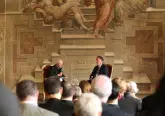Supreme Court rules DOMA unconstitutional

Staff Report
The Supreme Court of the United States ruled Wednesday morning that the Defense of Marriage Act, better known as DOMA, is unconstitutional. The decision was split 5-4 in the case officially known as U.S. vs. Windsor.
More on this topic: Supreme Court decisions on DOMA, Prop 8 called ‘tragic’ by U.S. Bishops
Further, the court effectively dismissed the case referring to California’s Proposition 8, which will likely lead to same-sex unions resuming in California.
Neither decision will have the effect of requiring states to honor same-sex marriages from other jurisdictions, but the DOMA case likely will affect how the federal government must treat same-sex marriages for purposes ranging from Social Security benefits to taxation.
Dan Andriacco, spokesman for the Archdiocese of Cincinnati, told The Catholic Telegraph that the decisions are not what the Archdiocese of Cincinnati and U.S. bishops hoped to see.
“Obviously we in the archdiocese and the bishops of the United States were hoping both cases would go the other way,” Andriacco said. “At this point however, it appears nothing in today’s actions nullifies the actions of Ohio and a number of other states in preserving traditional marriage. That is a very positive aspect of today’s developments. We’d really have to study the decisions further to understand the full implications but that’s the initial appearance of what happened today.”
The DOMA ruling extends more than 1,000 federal laws and statues to cover same-sex couples that are legally wed in Washington D.C. and the 12 states that have legalized such unions.
The opinion by Justice Anthony Kennedy blasted the law as having “the avowed purpose and practical effect … to impose a disadvantage, a separate status, and so a stigma upon all who enter into same-sex marriages made lawful by the unquestioned authority of the states.
“The act’s demonstrated purpose is to ensure that if any state decides to recognize same-sex marriages, those unions will be treated as second-class marriages for purposes of federal law,” Kennedy wrote. “This raises a most serious question under the Constitution’s Fifth Amendment.”
In Hollingsworth v. Perry, the U.S. Supreme Court says it will not rule on California’s Proposition 8, the voter-approved ban on same-sex marriage. It remanded the case to the lower court.
The state of California declined to defend Prop 8 when two couples sued to block it, so individuals who supported the law took up its defense.
In an opinion written by Chief Justice John Roberts, the Supreme Court ruled that those individuals lacked the legal standing to defend the law in federal court. The effect of the decision appears to be that the California trial court’s ruling that Prop 8 is unconstitutional will stand, at least initially. That would allow same-sex marriages to resume in California.
Andriacco also added that Catholic interest in this issue is not to impose Catholic beliefs on American law, but rather to perserve an institution that has been a cornerstone of society throughout the world.
“The Catholic Church’s interest in this issue is not to enshrine in law our own definition of marriage but to preserve the definition and understanding of marriage that everyone has held for thousands of years until just recent decades,” Andriacco said. “That has worked very well for the good of society.”
The U.S. Conference of Catholic Bishops and a number of organizations opposed to same-sex marriage had urged the court to issue rulings that upheld the traditional definition of marriage.
In 32 states, constitutional amendments ban same-sex marriage, while 12 states and the District of Columbia recognize such marriages. Another eight states recognize civil unions or domestic partnerships, with some having overlapping bans on same-sex marriage.
The Catholic News Service contributed to this report.













